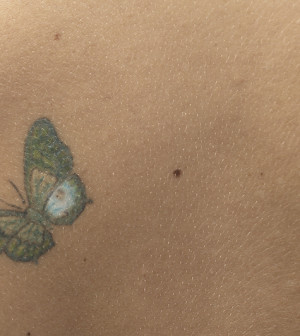- Could Your Grocery Store Meat Be Causing Recurring UTIs?
- Are You Making This Expensive Thermostat Error This Winter?
- Recognizing the Signs of Hypothyroidism
- 10 Strategies to Overcome Insomnia
- Could Artificial Sweeteners Be Aging the Brain Faster?
- Techniques for Soothing Your Nervous System
- Does the Water in Your House Smell Funny? Here’s Why
- Can a Daily Dose of Apple Cider Vinegar Actually Aid Weight Loss?
- 6 Health Beverages That Can Actually Spike Your Blood Sugar
- Treatment Options for Social Anxiety Disorder
Rosacea Might Boost Parkinson’s Risk: Study

Rosacea, a chronic skin condition that causes marked redness in the face, may be linked to an increased risk for Parkinson’s disease, a large, new study suggests.
Among more than 5 million Danes, those with rosacea were about twice as likely to develop Parkinson’s as those without the skin condition, said lead researcher Dr. Alexander Egeberg of Herlev and Gentofte Hospital in Copenhagen.
“Rosacea is a common facial skin disorder affecting up to 10 percent of light-skinned individuals, women in particular,” he said. “It is possible that rosacea, or rosacea-associated features, such as facial flushing, may contribute to Parkinson’s disease diagnosis at an early stage.”
The link appears to be associated with rosacea itself, not the medications used to treat it, the researchers said. They actually found reduced risk of Parkinson’s among patients who took tetracycline, a common rosacea treatment.
But figuring out the connection between Parkinson’s and rosacea is difficult, Egeberg said, because it’s not known what causes either condition.
The researchers speculate, however, that rosacea increases levels of an enzyme that breaks down proteins. This enzyme also has a role in Parkinson’s disease and other neurodegenerative disorders, they added.
“But that doesn’t mean that if you have rosacea, it will trigger Parkinson’s disease,” said Dr. Martin Niethammer, an attending neurologist at Northwell Health’s Neuroscience Institute in Great Neck, N.Y.
This study cannot prove that rosacea causes Parkinson’s disease, only that there seems to be an association between the two, Niethammer added.
“People with rosacea should not be very concerned about Parkinson’s disease based on this study,” Niethammer added.
Parkinson’s disease is a disorder of the central nervous system that worsens over time. Symptoms include tremors, slowed movements, impaired balance and thinking problems, according to the U.S. National Institute of Neurological Disorders and Stroke.
The report was published online March 21 in the journal JAMA Neurology.
In the study, Egeberg and colleagues identified about 22,000 Parkinson’s patients and more than 68,000 people with rosacea.
Not only were people with rosacea more likely to develop Parkinson’s disease, but they also appeared to have it two years earlier than patients without the skin condition, the researchers found.
Further studies are needed to confirm these findings, the researchers added.
More information
For more on Parkinson’s disease, visit the U.S. National Institute of Neurological Disorders and Stroke.
Source: HealthDay
Copyright © 2026 HealthDay. All rights reserved.










